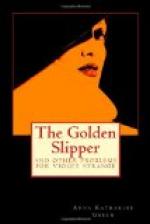“Not when you can save a bereaved woman the only possible compensation left her by untoward fate?”
“Let the police try their hand at that.”
“They have had no success with the case.”
“Or you?”
“Nor I either.”
“And you expect—”
“Yes, Miss Strange. I expect you to find the missing bullet which will settle the fact that murder and not suicide ended George Hammond’s life. If you cannot, then a long litigation awaits this poor widow, ending, as such litigation usually does, in favour of the stronger party. There’s the alternative. If you once saw her—”
“But that’s what I’m not willing to do. If I once saw her I should yield to her importunities and attempt the seemingly impossible. My instincts bid me say no. Give me something easier.”
“Easier things are not so remunerative. There’s money in this affair, if the insurance company is forced to pay up. I can offer you—”
“What?”
There was eagerness in the tone despite her effort at nonchalance. The other smiled imperceptibly, and briefly named the sum.
It was larger than she had expected. This her visitor saw by the way her eyelids fell and the peculiar stillness which, for an instant, held her vivacity in check.
“And you think I can earn that?”
Her eyes were fixed on his in an eagerness as honest as it was unrestrained.
He could hardly conceal his amazement, her desire was so evident and the cause of it so difficult to understand. He knew she wanted money—that was her avowed reason for entering into this uncongenial work. But to want it so much! He glanced at her person; it was simply clad but very expensively—how expensively it was his business to know. Then he took in the room in which they sat. Simplicity again, but the simplicity of high art—the drawing-room of one rich enough to indulge in the final luxury of a highly cultivated taste, viz.: unostentatious elegance and the subjection of each carefully chosen ornament to the general effect.
What did this favoured child of fortune lack that she could be reached by such a plea, when her whole being revolted from the nature of the task he offered her? It was a question not new to him; but one he had never heard answered and was not likely to hear answered now. But the fact remained that the consent he had thought dependent upon sympathetic interest could be reached much more readily by the promise of large emolument,—and he owned to a feeling of secret disappointment even while he recognized the value of the discovery.
But his satisfaction in the latter, if satisfaction it were, was of very short duration. Almost immediately he observed a change in her. The sparkle which had shone in the eye whose depths he had never been able to penetrate, had dissipated itself in something like a tear and she spoke up in that vigorous tone no one but himself had ever heard, as she said:




